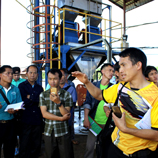
14 January 2019 - The United Nations Office on Drugs and Crime's (UNODC) alternative development programme in Lao PDR helps farmers move from cultivating opium to cash crops such as coffee. As part of this effort, UNODC enabled a group of new coffee farmers from the North of the country to participate in a week-long study visit to an already established community of coffee growers in southern Laos.
The new coffee farmers come from a community of 331 families from 12 villages in the Northern province of Huaphahn, where they face issues related to opium, poverty, addiction, and the remnants of war. Located within the geographical region called the 'golden triangle', an important occupation in this area has traditionally been opium cultivation. Families have been growing poppy for generations, feeding a vicious cycle of addiction, fear for law-enforcement, poverty and food insecurity.
UNODC's alternative development project has been working with the community since 2016 to establish a sustainable solution that breaks this cycle. The families have come together in cooperation under the name "Vanmai Coffee" to grow coffee instead of poppy. Vanmai means 'new day' in the local Lao language, symbolizing the community's hopes for a prosperous, healthy and sustainable future that coffee can bring for their villages.
In the last week of November 2018, Vanmai farmers travelled to the Bolaven Plateau in southern Laos to participate in a week-long study visit and learn from coffee experts and coffee farmers in the established coffee areas of the Plateau.
From learning about the processing of coffee beans to the essentials of a successful cooperative, the farmers gained confidence and knowledge to bring back to their villages. Along with technical trainings, highlights of the week included coffee tasting, barista tips and guidance on how to establish a coffee culture in the villages of Huaphahn.
"This study trip is exactly what we needed right now. Learning from experts at the Coffee Research Institute and with established farmers and cooperatives here, I have learned so much in just five days." said Mr. Jouma, a farmer from Huay Yam village.
"Study visits like this are extremely valuable. One thing is that the farmers can improve their technical knowledge on coffee, but the most important thing we see is that this really helps them get a vision and a plan for the future. Seeing with their own eyes how other smallholder farmers have taken charge of their own future by working together and focusing on value chains and quality products, is a real eye-opener," explained Erlend Audunson Falch, programmer manager at UNODC in Lao PDR.
Community members from Huaphahn said they are determined to make an income from coffee, but also want to educate others on the harm that illegal opium cultivation brings to communities. Through blogs, the farmers also want to share their stories of struggle, hope, ambition and inform others about their community of resilient individuals living in one of the poorest communities of the region.
"We all want to improve our life for our families, we want to set up something that can be passed on to our children so they do not have to worry about their income. If we work together like this I am hopeful that we can achieve something good." says Mr. Jouma.
Vanmai Coffee's first commercial harvest is expected after the 2019 monsoon season. The community hopes that in the coming years their cooperative can grow and reach both domestic and international coffee markets.
UNODC's work on sustainable alternative development in Southeast Asia